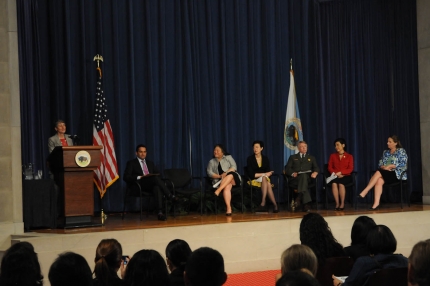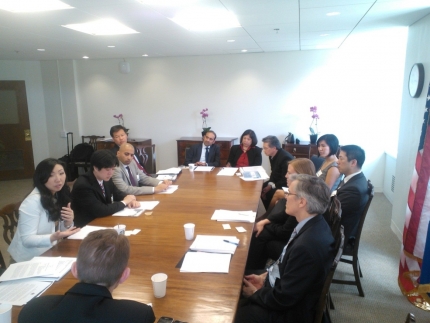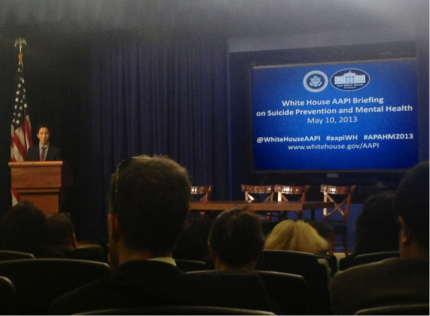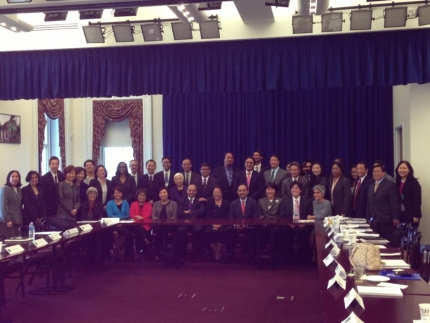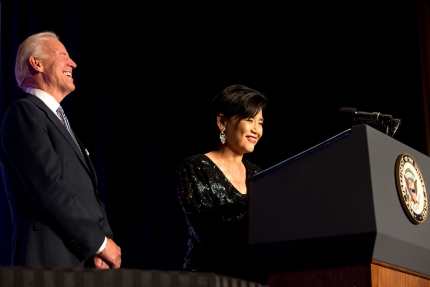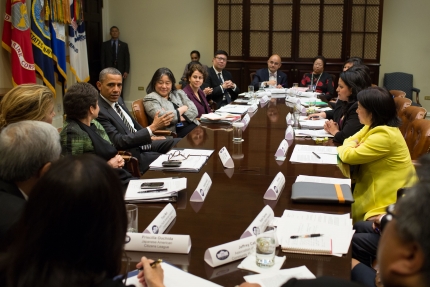Initiative on Asian Americans and Pacific Islanders Blog
White House Forum on Asian American and Pacific Islander Heritage
Posted by on May 13, 2013 at 12:13 PM ESTOn Thursday of last week, nearly 400 Asian American and Pacific Islanders (AAPI) from all walks of life gathered at the Department of the Interior for the White House Forum on Asian American and Pacific Islander Heritage, where we discussed ways the Department, especially the National Park Service, can better tell the story of the AAPI experience in America and the contributions this vibrant community has made to our country and its culture.
As a first generation Korean-American, the forum was especially meaningful for me. My parents left Korea in the aftermath of the Korean War. They came to this country with $200 in their pockets and three sets of clothes each. Even with no relatives or friends to greet them and little knowledge of English my parents nevertheless harbored big dreams. They believed that with hard work, a commitment to education, and playing by the rules, they and their children would prosper. And because of their perseverance and courage, we did. I know they are proud that their daughter is now serving as an official in the Obama Administration.
This isn’t just the story of my parents, or the story of Asian Americans, however: it is the story of America. This is why it so important that the National Park Service, which is our nation’s story teller, explores ways to commemorate and interpret the journey of the millions of AAPI pioneers who came to these shores and the role they had in building America.
During the forum, our new secretary, Sally Jewell, pledged her support for the AAPI Theme Study. “Asian Americans and Pacific Islanders have long been leaders in every aspect of our social fabric – in government, business, science, medicine, the arts, education and our armed forces,” Secretary Jewell said. “From Angel Island where more than one million Asian immigrants arrived on these shores, to the Chinese immigrants who helped build the railroads across the country, to the Japanese American internment camps of World War II, these stories are all important threads in the great American tapestry.”
AAPI leaders from across the country discussed our community’s progress, and how our stories really constitute the fabric of the larger American story. We also discussed National Park Service’s efforts, over the coming months, to guide the theme study scholars in developing narratives that will connect tangible places to so many intangible stories. The Service’s National Historic Landmark program will use the theme study to guide future nominations of National Historic Landmarks and National Register properties.
It was a proud day for me to see so many distinguished AAPI leaders coming together to honor those who went before us and to ensure their story is told for future generations.
Click here for more information about the theme study, or if you would like to get involved, please email us AAPI@ios.doi.gov.
Rhea S. Suh is the Assistant Secretary for Policy, Management and Budget at the U.S. Department of the Interior.
Learn more aboutWhite House Initiative on AAPIs meets with Economic Agencies
Posted by on May 13, 2013 at 8:17 AM ESTLast week, the White House Initiative on Asian Americans and Pacific Islanders participated in a roundtable discussion with representatives of various economic agencies of the U.S. Government. The discussion focused on what agencies can do to continue to support the economic development of Asian American and Pacific Islander communities.
With 1.5 million AAPI-owned businesses in the United States, having AAPI-owned businesses engaged in international trade can help contribute to the overall economy. Many AAPI-owned businesses have strong ties across Asia and are in a prime position to help export goods, create jobs here at home and support the President’s National Export Initiative to double exports by 2015.
The Initiative emphasized the importance of fostering economic linkages between AAPI-owned businesses in supporting the Administration’s rebalancing efforts across the Asia-Pacific region and the Trans-Pacific Partnership. Agency representatives expressed their interest in working closely with the Initiative to co-host forums to introduce the community to the President’s economic agenda as well as display the various federal resources available to AAPI-owned businesses to start and expand their businesses globally.
Adil Kabani is the Economic Policy Advisor with the White House Initiative on Asian Americans and Pacific Islanders.
Learn more aboutRaising Awareness about Mental Health and Suicide Prevention in the AAPI Community
Posted by on May 10, 2013 at 4:22 PM ESTThe White House Initiative on Asian Americans and Pacific Islanders and the White House Office of Public Engagement hosted a briefing today on mental health issues and suicide prevention for the Asian American and Pacific Islander (AAPI) community. As May is both AAPI Heritage Month and National Mental Health Awareness Month, it was a timely occasion to bring these issues to the forefront. The event convened government officials, community leaders, students and health care advocates for a discussion about the Obama Administration’s efforts to prevent suicide and address mental health issues within the AAPI community.
Mental health concerns are not prominently or routinely addressed in AAPI communities, however, these issues are primary contributors to overall health and well-being. National studies show that the prevalence rates for mental health conditions are generally the same or slightly less for AAPIs compared to the general population. However, the burden of mental health conditions for AAPI families and communities is often greater due to limited access and engagement in mental health services, lower rates of treatment and poorer quality care leading to worse outcomes. AAPI families are often reluctant to seek care due to the stigma and discrimination associated with mental health conditions, difficulties in finding appropriate services and lack of understanding of both the mental health condition and the complex service system. Higher rates of uninsurance also impede attempts to access mental health treatment.
The briefing also highlighted AAPI-serving community mental health programs, suicide prevention initiatives such as the National Suicide Prevention Lifeline and the National Strategy for Suicide Prevention and government resources. Also featured was the California Reducing Disparities Project Asian Pacific Islander report “In Our Own Words,” which outlined effective strategies for reducing AAPI behavioral health disparities and provided specific program examples.
During this month of celebration of the AAPI community, this event was a fitting opportunity to recognize and re-dedicate ourselves to the ongoing work to increase awareness of mental health, address disparities and improve the wellbeing of AAPIs across the nation. Please visit the Office of Behavioral Health Equity and Substance Abuse and Mental Health Services Administration (SAMHSA) website to learn more about mental health and substance use among AAPIs, and to access a new data spotlight on AAPIs and suicide.
Larke N. Huang, Ph.D. is the Director of the Office of Behavioral Health Equity at the Substance Abuse and Mental Health Services Administration, U.S. Department of Health and Human Services
Learn more about Health CarePresident’s Advisory Commission on Asian Americans and Pacific Islanders Meet in Washington, D.C.
Posted by on May 10, 2013 at 4:16 PM ESTEarlier this week, I had the pleasure of chairing a meeting of the President's Advisory Commission on Asian Americans and Pacific Islanders (AAPIs) in Washington, D.C. The Commission is composed of 20 individuals who hail from all over the nation from New York to California, Hawaii to Guam – and from a wide range of backgrounds business, education, civil rights, farming, health, philanthropy, sports and so many more. We serve as the eyes and ears of the Administration, relaying issues and recommendations from AAPI communities to the Administration.
This meeting came at an exciting time – as we kicked off Asian Pacific American Heritage Month and reflected on the Commission's and Initiative’s past accomplishments and progress. We set the direction for the Initiative's work over the next four years, met with Administration officials about the Affordable Care Act and Commonsense Immigration Reform, and discussed the challenges that still remain.
On May 7, we were invited to a meeting of the Interagency Working Group (IWG).. The IWG is comprised of senior-level Administration officials from across the federal government tasked with creating and implementing agency plans to increase AAPI participation in and access to federal programs.
At the meeting, we learned about four new sub-committees within the IWG focused on language access, research and data, capacity building, and workforce diversity. The chair of each sub-committee explained specific issues they would target and set forth concrete goals. Also, the launch of the Regional IWG was announced at the meeting.& The Regional IWG, currently comprised of forty federal representatives representing 11 agencies and sub-agencies from across the country, will help link federal programs and resources directly to the community.
We appreciated the time to meet with IWG members to learn about issues facing our communities, and to discuss possible solutions. Collectively, the Commission left rejuvenated understanding the great work that the Administration is doing and committed to carrying out in the future, and understanding our role to make the goal of AAPI inclusion a reality.
Daphne Kwok is Chair of the President’s Advisory Commission on Asian Americans and Pacific Islanders.
Learn more about ,Vice President Biden Addresses the Asian American and Pacific Islander (AAPI) Community
Posted by on May 10, 2013 at 11:33 AM ESTOn Wednesday night, Vice President Joe Biden delivered keynote remarks before nearly 1,000 Asian American and Pacific Islander (AAPI) national, state, and local community leaders at the Asian Pacific American Institute for Congressional Studies (APAICS) Gala Awards Dinner.
In his remarks, Vice President Biden paid tribute to the late Senator Daniel K. Inouye, who both the President and Vice President eulogized last December. The Vice President also emphasized that by striving for possibility, equality, and justice for future generations, the AAPI community continues to embody Senator Inouye's legacy. Finally, the Vice President described the importance of commonsense immigration reform to the AAPI community and to strengthening the American economy and growing the middle class.
Danielle Borrin is Director of Intergovernmental Affairs and Deputy Director of Office of Public Engagement in the Office of the Vice President. Gautam Raghavan is Associate Director in the White House Office of Public Engagement.
Learn more about ,President Obama Meets with AAPI National Leaders
Posted by on May 9, 2013 at 11:57 AM ESTYesterday, President Obama met with a group of Asian American and Pacific Islander (AAPI) national leaders to discuss his call for commonsense immigration reform that will strengthen the economy and grow the middle class. Here’s a part of the readout from the meeting:
The President emphasized that commonsense immigration reform continues to be a top legislative priority and that he looks forward to working with the AAPI community to achieve that goal. The leaders expressed their support for the principles that the President and key Senators working on immigration reform have laid out and their strong desire for a bill that provides a pathway to earned citizenship and supports family unity. The leaders also expressed their commitment to working with Congress to strengthen the legislation that is being considered. The President and the leaders also discussed a number of issues of importance to Asian Americans, Native Hawaiians, and Pacific Islanders, including efforts to provide affordable, accessible health care to AAPI communities. Finally, the President thanked participants for their leadership and commitment to ensuring that the American Dream remains attainable for all communities and families, as well as generations to come.
Gautam Raghavan is an Associate Director in the White House Office of Public Engagement
Learn more about , , Immigration
- &lsaquo previous
- …
- 29
- 30
- 31
- 32
- 33
- 34
- 35
- 36
- 37
- …
- next &rsaquo
White House Blogs
- The White House Blog
- Middle Class Task Force
- Council of Economic Advisers
- Council on Environmental Quality
- Council on Women and Girls
- Office of Intergovernmental Affairs
- Office of Management and Budget
- Office of Public Engagement
- Office of Science & Tech Policy
- Office of Urban Affairs
- Open Government
- Faith and Neighborhood Partnerships
- Social Innovation and Civic Participation
- US Trade Representative
- Office National Drug Control Policy
categories
- AIDS Policy
- Alaska
- Blueprint for an America Built to Last
- Budget
- Civil Rights
- Defense
- Disabilities
- Economy
- Education
- Energy and Environment
- Equal Pay
- Ethics
- Faith Based
- Fiscal Responsibility
- Foreign Policy
- Grab Bag
- Health Care
- Homeland Security
- Immigration
- Innovation Fellows
- Inside the White House
- Middle Class Security
- Open Government
- Poverty
- Rural
- Seniors and Social Security
- Service
- Social Innovation
- State of the Union
- Taxes
- Technology
- Urban Policy
- Veterans
- Violence Prevention
- White House Internships
- Women
- Working Families
- Additional Issues
